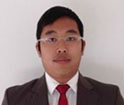By The Malaysian Actuary
 Editor’s Note: This is a reprint of an article that appeared in the
November 2015 issue of The Malaysian Actuary, a newsletter
published by the Actuarial Society of Malaysia.
Editor’s Note: This is a reprint of an article that appeared in the
November 2015 issue of The Malaysian Actuary, a newsletter
published by the Actuarial Society of Malaysia.
This is the latest in the “Innovators and Entrepreneurs” series of interviews sponsored by the Entrepreneurial & Innovation Section of the SOA to actuaries in entrepreneurial roles. Nicholas Yeo is the Founder of Nicholas Actuarial Solutions. He holds a BSc in Actuarial Science from Cass Business School. He is a fellow of the Institute and Faculty of Actuaries (UK), a fellow of the Actuarial Society of Malaysia, and a fellow of the Society of Actuaries (US). Nicholas was the chairperson of the Professional Development Committee and Events Committee of the Actuarial Society of Malaysia. He is a frequent speaker in actuarial conferences and very active in the field of actuarial education.
- What abilities or personal qualities do you believe contribute most to success in this field?
- What do you enjoy the most in this field and what are the problems or frustrations you have encountered?
- What are your 3 biggest accomplishments?
- A paper accepted for the 2014 International Congress of Actuaries;
- Acknowledgement from students that my mock exam marking and exam revisions organised via ASM (The Actuarial Society of Malaysia) contributed to their exam success;
- Every time I successfully apply the actuarial control cycle.
- Who are the actuaries you look up to and why?
- What is your opinion about the current Actuarial industry in Malaysia and its outlook in the next few years?
- The economic community of the Association of Southeast Nations will bring many business opportunities to actuaries in the region, particularly in Malaysia;
- The impending implementation of International Financial Reporting Standard 4 Phase II will enlarge the reporting role of the actuarial profession;
- The growing sentiment amongst key stakeholders that enterprise risk management contributes significantly to growth, profitability and sustainability in all industries will allow actuaries to add value outside the traditional areas;
- The budding technological start-up sphere in Malaysia will create demand for data management. The actuarial profession, equipped not only with technical abilities but also with good communication skills and a high standard of professionalism, is in a good position to capitalise on this development;
- The wages of local actuaries in Malaysia are lower than in other countries. This is concerning because the long-term equilibrium could gravitate towards a reduction of quality rather than higher wages that support high quality work.
- You completed your fellowship in just 3 years. What special advice do you have for those seeking to qualify as a Fellow?
I believe the biggest strength of the actuarial profession is our communication skills.
There are always jokes about actuaries not communicating well. People sometimes forget that actuaries communicate uninteresting things to uninterested people, whereas other skilful communicators, like politicians, only communicate interesting things to interested people.
Nonetheless, it is the training that includes a communications exam1 that makes actuaries better communicators than others, and gives the profession an advantage which many others envy.
What I enjoy the most is the opportunity to work with fellow professionals who have high levels of integrity and competence.
The biggest frustration is the lack of publicity of the profession. I am referring to professional encounters rather than casual encounters like trying to explain to a taxi driver what I do for a living. Everyone in this world recognises that doctors can save lives, but most people need to be convinced that actuaries possess exceptional business acumen, and a strong grasp of strategic, operational and risk management matters, which contribute significantly to businesses and society.
From a professional perspective:
I consciously do not look up to anyone, actuaries or otherwise. I believe on average everyone is equal, so if you look up to someone you will inadvertently look down at the rest. I feel that if I look up to someone, before I know it, by default, I will be looking down at others – something I don’t like to do.
The Malaysian actuarial profession has many opportunities:
There are two groups of actuarial students. The first group is those who pass exams easily. I didn’t belong to this group. I don’t know what to say to this group except maybe that they can afford to study a little less to have a life. The group to which I belong is composed of those for whom the exams are tough and can pass them only with full focus and a strong commitment. This is a group of people who are not that smart. We are challenged to our limits, but as long as we have a burning desire and give priority to our studies we pass.
Then you ask, “what about those actuarial students who cannot pass their exams?” No, there isn’t a third group of actuarial students. An actuarial student, by definition, is someone that has sufficient ability to pass exams and qualify as an actuary. You must be confident about your abilities. Then, you need to have a burning desire and make passing the exams a priority. After this, other tricks like time management, exams techniques etc. can make passing exams a bit easier.
1Part of the education system in the UK.